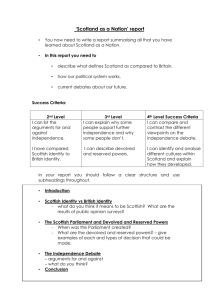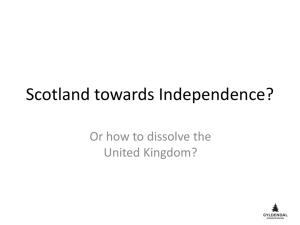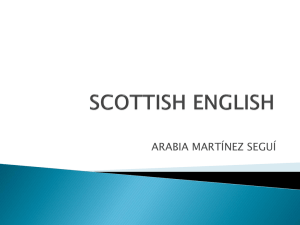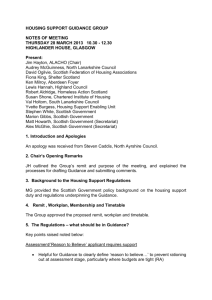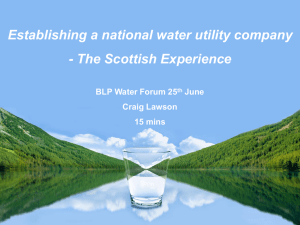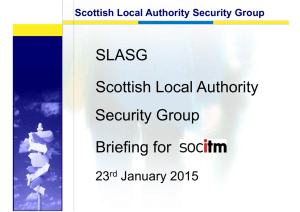Independence - University College London
advertisement
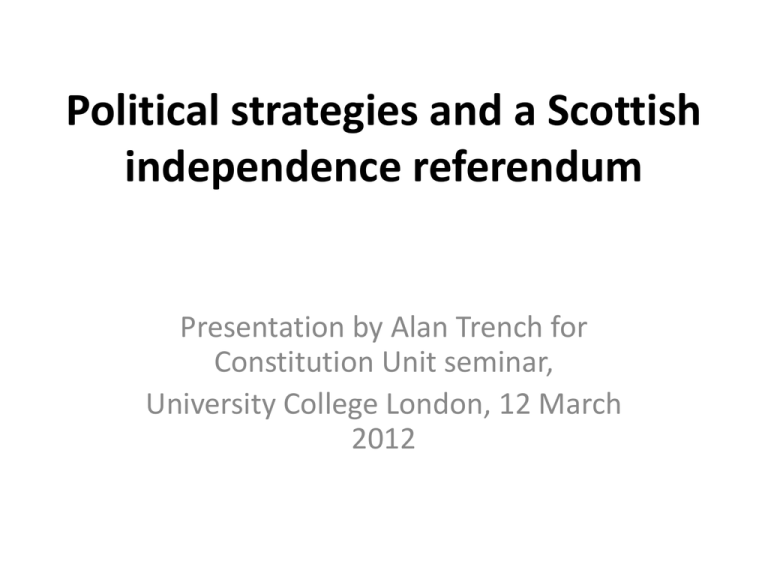
Political strategies and a Scottish independence referendum Presentation by Alan Trench for Constitution Unit seminar, University College London, 12 March 2012 The bulk of Scottish voters don’t want independence: they want selfgovernment within the Union But they may get independence anyway! Constitutional Preferences In Scotland, 1997-2010 60 remain part of UK with its own elected Parliament which has some taxation powers 50 40 be independent, separate from UK and EU or separate from UK but part of EU 30 remain part of the UK without an elected parliament 20 10 * 2010 * 2009 * 2007 * 2006 * 2005 * 2004 * 2003 * 2002 * 2001 * 2000 * 1999 * Sept 97 * May 97 0 remain part of the UK with its own elected Parliament which has no taxation powers A tale of two strategies Bifurcated constitutional debates since 2007 • SNP’s strategy: – ‘Win-win’ (independence or Devo Max) • 2 questions • Unionist strategy: – Deny there’s an issue (historically) – Now: ‘Excluded middle’ • Single question – Plus ‘jam tomorrow’ (Devo More after a referendum No vote – not before) Who ought to have the most say over how Scotland is run? (%) 80 70 60 50 Scottish Parl't/Govt UK Government 40 Local Councils 30 European Union 20 10 0 2000 2001 2003 2004 2005 2006 2007 2009 2010 Who has the most say over how Scotland is run? (%) 70 60 50 Scottish Parl't/Govt 40 UK Government 30 Local Councils European Union 20 10 0 2000 2001 2003 2004 2005 2006 2007 2009 2010 Discrepancy between where Scots want the power to lie, and where they perceive it to lie 80 70 60 Upper Line: The Scottish Government Ought To have the most say 50 40 Lower Line: The Scottish Government Does have the most say 30 20 10 0 * 2000 * 2001 * 2003 * 2004 * 2005 * 2006 * 2007 * 2009 * 2010 How the SNP might win • Frame the overall issue as ‘how should Scotland be governed?’ (positive, issue of principle) • Conflate UK and England; emphasise dyarchic Scotland-UK relationship) and differences between Scotland and UK, and treat UK as ‘foreign’ and ‘interfering’ – Lack of UK ‘neutrality’ • Keep issue on agenda (2nd-order questions) • Show that independence is closer to what Scots want than what Unionists can offer Scottish Constitutional Positions and Perceptions How Unionists might win • Raise question about ‘what sort of a state would an independent Scotland be?’ (issue of practice – emphasises doubts) • Play the game straight when making the rules • Need to have an ‘offer’ that is closer to what Scots want than independence is • But that offer must be convincing – need to shift the ‘status quo’ position – Boredom/loss of trust Scottish Constitutional Positions and Perceptions Devo More • Key elements: – Substantial fiscal responsibility: 60% + of devolved spending – My model: all personal income tax, assignment of VAT, plus smaller land taxes – Corporation tax the fiscal battleground – More policy areas: aspects of social security, broadcasting, immigration? • Fragmented initiatives: – Labour, Lib Dems, ‘civic society’, Reform Scotland • How to make it convincing? – Must have broad, cross-party support before referendum – Get it on the statute book before then? Read more on the Devolution Matters blog: http://devolutionmatters.wordpress.com/




